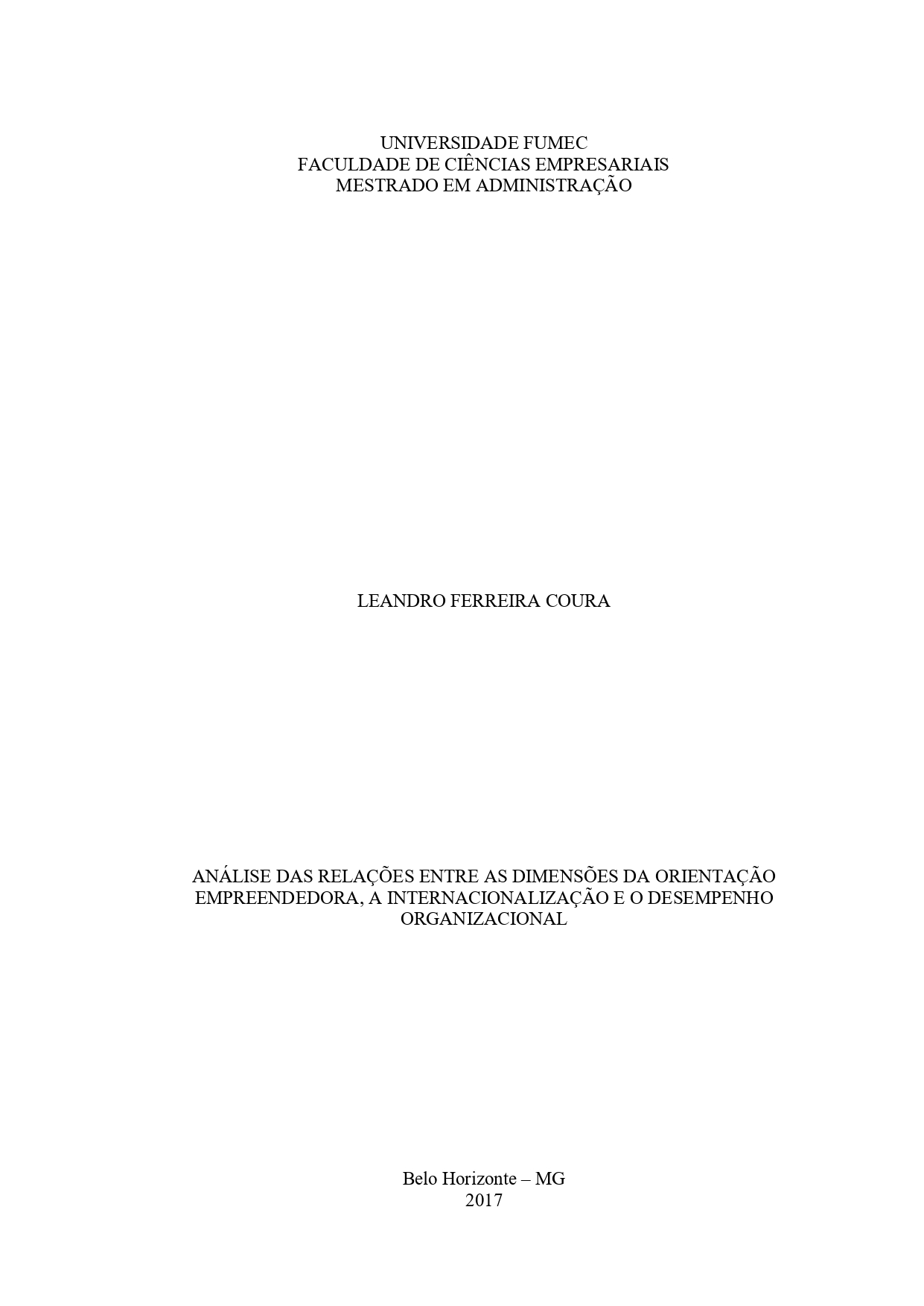Análise das relações entre as dimensões da orientação empreendedora, a internacionalização e o desempenho organizacional

Visualizar/
Data
2017Autor
Coura, Leandro Ferreira
xmlui.mirage2.itemSummaryView.MetaData
Mostrar registro completoResumo
Esta pesquisa analisa a relação e a intensidade entre as dimensões antecedentes da orientação empreendedora, a saber, inovatividade, assumir riscos, agressividade competitiva, autonomia e proatividade, no desempenho organizacional, considerando o efeito moderador da internacionalização. Foi realizada em empresas dos setores de agronegócio, comércio, engenharia, indústria, logística e transporte, serviços e informática/telecomunicações. É uma pesquisa de abordagem quantitativa, natureza descritiva, amostra não probabilística e tratamento de dados mediante análise estatística multivariada. O questionário em escala tipo Likert de 7 pontos aplicado compõe-se de 18 questões sobre os construtos e da caracterização dos respondentes e empresas em que atuam. Os objetivos específicos foram: a) identificar os principais construtos que influenciam o desempenho organizacional; b) testar um modelo de relação entre os construtos; e c) verificar se as relações entre os construtos implicam em variação no desempenho. O objetivo geral foi: Analisar a influência da orientação empreendedora ao ser moderada pela internacionalização no desempenho organizacional. A metodologia fundamentou-se em análises estatísticas pertinentes à validação da escala, tais como: análise fatorial exploratória e análise fatorial confirmatória. O modelo conceitual proposto foi avaliado com o auxílio da Modelagem de Equações Estruturais Partial Least Squares (MEE-PLS). Na análise do modelo estrutural hipotético, verificaram-se: validade convergente, validade discriminante e confiabilidade dos construtos. A aplicação do questionário procurou atender à disponibilidade do respondente e à conveniência do entrevistador. Foram enviados 2.100 emails individuais, com 14,4% de taxa de retorno, ou 303 respondentes, e 281 questionários válidos. Os resultados obtidos indicam que houve influência significativa e positiva da orientação empreendedora e seus antecedentes no desempenho organizacional, com exceção do construto autonomia, que obteve carga negativa e não foi confirmado. A orientação empreendedora e seus antecedentes são capazes de explicar aproximadamente ≈ 42% do desempenho organizacional. Nesse sentido, quanto maior a influência da orientação empreendedora e de seus antecedentes nas empresas melhor o desempenho organizacional. Os resultados obtidos sugerem a continuidade da aplicação do modelo em outras amostras para comparação. This research analyzed the relationship and intensity between the antecedent dimensions of the entrepreneurial orientation, such as, innovativeness, risk-taking, competitive aggressiveness, autonomy and proactiveness, in the organizational performance, considering the moderating effect of internationalization. The research was carried out in companies from the agribusiness, commerce, engineering, industry, logistics and transportation, services and information tecnology sectors. It´s a research of quantitative approach, descriptive nature, non-probabilistic sample and data treatment through multivariate statistical analysis. The questionnaire is on a 7-point Likert scale and consists of 18 questions about the constructs, as well as the characterization of respondents and companies that work. The objective of the research was: a) identify the main constructs that influence organizational performance; b) to test a model with the relation between the constructs and, c) to verify if the relationships among the constructs imply a variation in the performance. The general objective studied was to analyze the influence of the entrepreneurial orientation to be moderated by the internationalization in the organizational performance. The methodology was based on statistical analyzes pertinent to scale validation, such as exploratory and confirmatory factor analysis. The proposed conceptual model was evaluated with the aid of the Partial Least Squares Structural Modeling (MEE-PLS). In the analysis of the hypothetical structural model, the convergent validity, the discriminant validity and the reliability of the constructs were verified. The application of the questionnaire was made by the availability of the respondent and the convenience of the interviewer. A total of 2,100 individual emails were sent, with 14.4% rate of return, 303 respondents and 281 valid questionnaires. The results indicate that there was a significant and positive influence of the entrepreneurial orientation and its antecedents on organizational performance, with the exception of the autonomy construct that obtained a negative charge and was not confirmed. Entrepreneurial orientation and the antecedent dimensions are able to explain ≈ 42% of organizational performance. In this sense, the greater the influence of the entrepreneurial orientation and its antecedents in the companies, the better the organizational performance. The obtained results suggest the continuity of application of the model in other samples for comparison.
